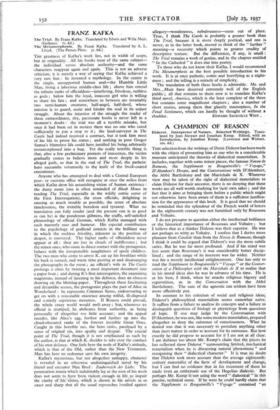FRANZ KAFKA
The Trial. By Franz Kafka. Translated by Edwin and Willa Muir. (Gollancz. 78. 6d.)
THE greatness of Kafka's work lies, not in width of scope, but in originality. All his books treat of the same subject—
the individual versus absolute authority—and the same characters reappear again and again. This is not an adverse criticism, it is merely a way of saying that Kafka achieved a very rare feat : he invented a mythology. In the centre is the single, unsupported human soul—the Humble Little Man, living a laborious middle-class life ; above him extend the infinite ranks of officialdom—interfering, frivolous, ruthless as gods ; below him the loyal, innocent girl who is willing to share his fate ; and somewhere in between are invariably two semi-human creatures, half-angel, half-devil, whose mission is to guard, assist and hinder the soul in its unjust struggle. About _ the injustice of the struggle the reader of these extraordinary, dry, passionate books is never left in a moment's doubt : the trial was all a terrible mistake, but once it had been set in motion there was no one who cared sufficiently to put a stop to it ; the land-surveyor in The Castle bad indeed received a contract, but it took him most of his life to prove his status ; and nothing in poor Gregor Samsa's blameless life could have justified his being arbitrarily metamorphosed into a bug. Yet the really terrible thing is that, after a few preliminary protests of innocence, the victim gradually comes to believe more and more deeply in his alleged guilt, so that in the end of The Trial, the pathetic hero succumbs voluntarily to the knife of the frock-coated executioner.
Anyone who has attempted to deal with a Central European post- or customs office will recognise at once the milieu from which Kafka drew his astonishing vision of human existence : the dusty room (one is often reminded of Bleak House in reading The Trial, especially in the wildly comic scene of the First Interrogation), the cross officials, delighting in causing as much trouble as possible, the sense of absolute timelessness, the irritable boredom and tyranny. What no translation can fully render (and the present one is as good as can be) is the ponderous glibness, the stuffy, self-satisfied phraseology of official German, which Kafka managed with such masterly ease and humour. His especial contribution to the psychology of godhead consists in the brilliant way in which the reckless frivolity, inherent in the position of despot, is conveyed. The higher ranks of officialdom never appear at all : they are lost in clouds of indifference ; but the minor ones, who come in direct contact with the protagonist, behave with the irresponsible naughtiness of spoilt children. The two men who come to arrest K. eat up his breakfast while his back is turned, and• waste time peering at and disarranging the photographs in the room ; an official's wife in The Castle prolongs a crisis by twisting a most important document into a paper boat ; and during K's first interrogation, the examining magistrate, instead of listening to his defence, does an obscene drawing on the blotting-paper. Throughout these fascinating and dreamlike scenes, the protagonist plays the part of Alice in Wonderland : he_ represents Common Sense, endeavouring to get on with a reasonable existence among wilful, ill-disposed and r-uirely capricious monsters. If Reason could prevail, the whole crazy world would melt away ; but, whenever an official is stumped, he abdicates from authority, as being personally of altogether too little account; and the appeal recedes, like Alice's egg, further and further up into the cloud-obscured ranks of the forever invisible Great Ones. Caught in this horrible net, the hero sinks, paralysed by a sense of original sin, into apathy and despair. The crucial point of The Trial, though it is not emphasised as such by the author, is that at which K. decides to take over the conduct of his own defence. One feels here the node of Kafka's attitude, which is that of the Old, rather than the New Testament. Man has here no redeemer save his own integrity.
Kafka's mysterious, but not altogether unhappy, character is revealed in an otherwise undistinguished novel by his friend and executor Max Brod : Zauberreich der Liebe. The persecution mania which indubitably lay at the root of his work does not seem, to . have been violent enough in. lifer to impair the clarity 'of :his which- is shown` in his novels as so exact and sharp that all the usual reproaches levelled against
allegory—woodenness, nebulousness—seem out of place. True, I think The Castle is probably a greater book than The Trial, because it is more deeply poetical, and one is never, as in the latter book, moved to think of the " further 7 meaning—a necessity which points to greater crudity of descriptive texture. But the difference, if any, is small • The Trial remains a work of genius, and in the chapter entitled " In the Cathedral " it does rise into poetry.
To those who do not know their Kafka, I would recommend The Metamorphosis as the best possible introduction to his work. It is at once pathetic, comic and horrifying as a night- mare ; and the telling is a miracle of simplicity.
The translation of both these books is admirable. Mr. and Mrs.. Muir have deserved extremely well of the English public ; all that remains to them now is to translate Kafica's third novel, America, which is the least complete of the three but contains some magnificent chapters ; also a number of short stories, among them, that ghastly masterpiece, In the
Penal Settlement, which can hardly be thought of without a






























































 Previous page
Previous page